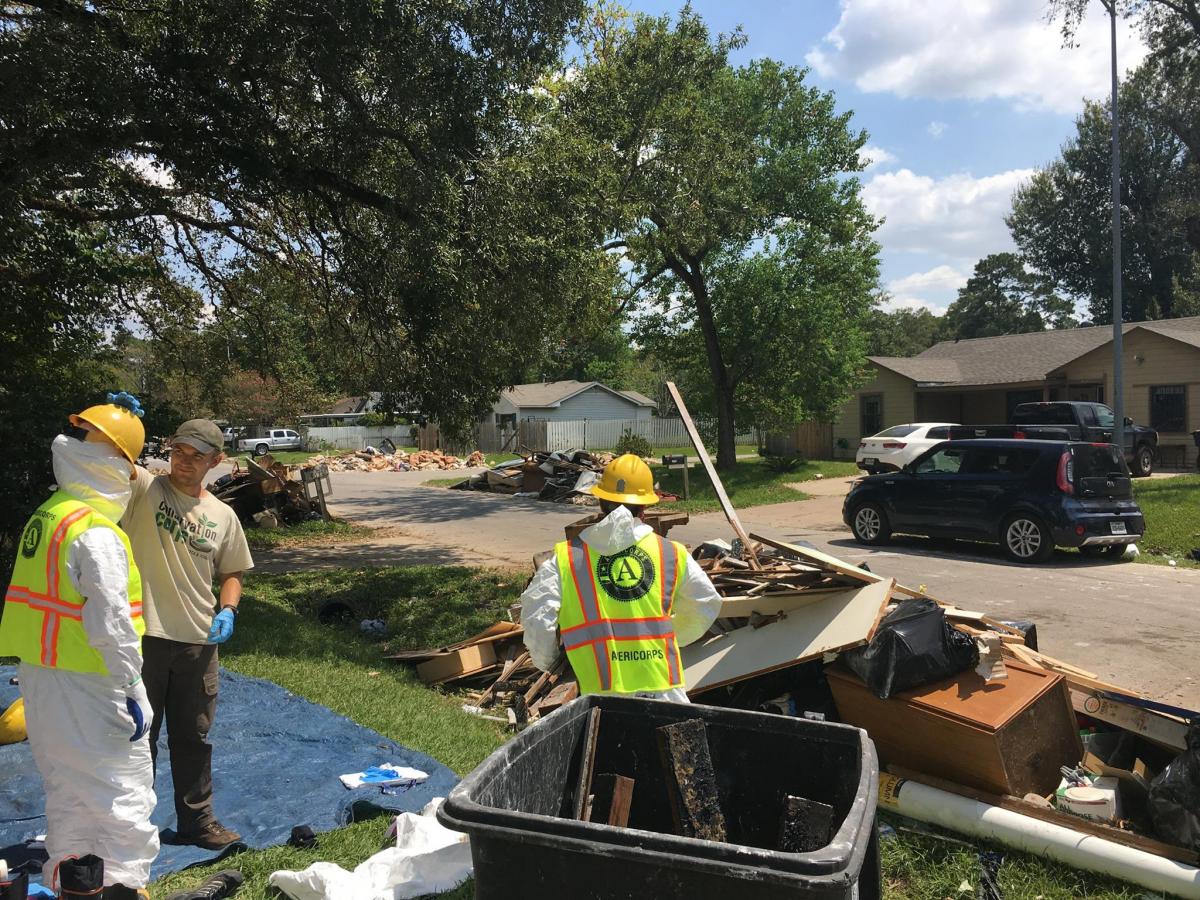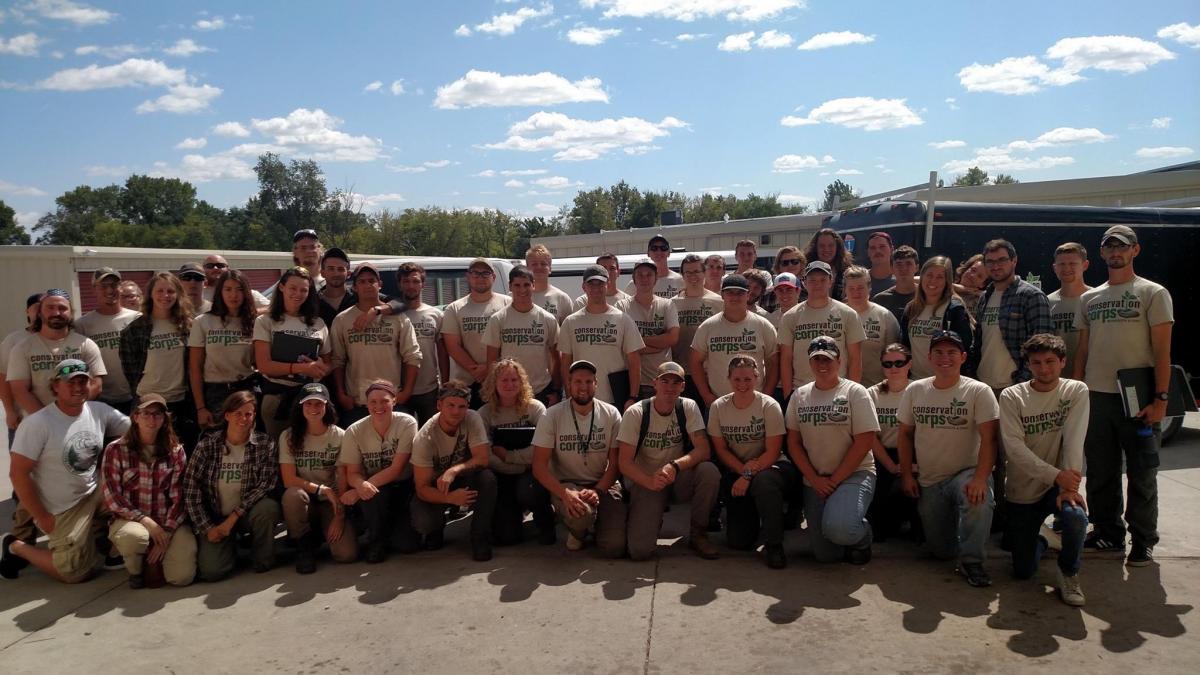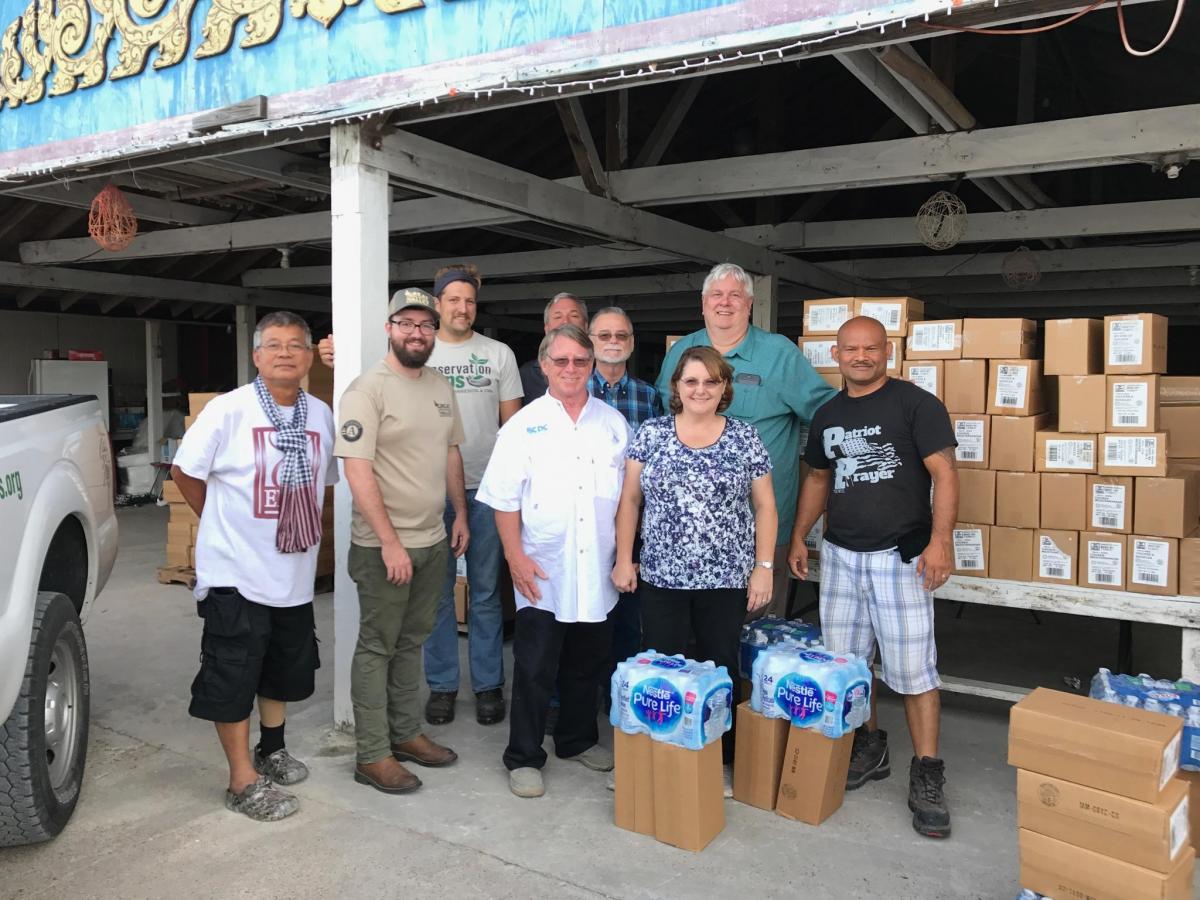

AmeriCorps members gut homes damaged in Hurricane Harvey.
In response to Hurricanes Harvey, Irma and Maria, several member organizations of The Corps Network have sent crews to Texas, Puerto Rico and the U.S. Virgin Islands. Cooridnation of most of these deployments has been through the AmeriCorps Disaster Response Team (A-DRT) program.
Corpsmembers from across the country have assisted with a range of activities, including clearing debris, coordinating volunteers and donations, conducting damage assessments, and helping muck, gut and tarp homes. Below, read the firsthand account of Caleb Bell, an AmeriCorps member from Conservation Corps Minnesota & Iowa who deployed to Texas.
By Caleb Bell
My name is Caleb Bell. I was born in Des Moines, IA, raised in Colorado, and I went to Iowa State University for college.
My AmeriCorps term this year has been great. I joined Conservation Corps Minnesota and Iowa (CCMI) for the professional experience of leading a crew and learning new land management skills. I wanted to get more field and leadership experience and I have received both during my AmeriCorps term.
One big reason I joined AmeriCorps is because I didn’t know what to expect. It was something new and unpredictable. My home base is in Western Iowa. All I knew going into my term was that I would be doing land management: using chainsaws, brush sawing, treating invasive species, and hopefully having the chance to work on prescribed burns. I ended up doing a lot of burning. My crew completed over 6,000 acres of prescribed burns in about three months. Before being deployed on disaster, my plant identification skills increased and my professional communication and leadership skills grew.

Heading to Texas
When I found out I would be deployed for disaster response, I was excited. I knew there would be a lot more to learn; that’s a huge reason I joined AmeriCorps.
Going into the disaster response deployment, all I knew was that I was leaving for Texas. I knew that I would be in Austin for training, but had no idea what would come after that. I was told either Corpus Christi or Houston were the most likely locations, but I wasn’t told what I would be doing. I left my shop in Honey Creek, IA at 7:00 am on September 5 for Ames, IA; then I drove from Ames to St. Louis, MO that same night. I arrived in Austin just before midnight on September 6.
When I got to Austin, I thought my deployment would only be for 30 days. Three weeks into my deployment I was told I could stay until November 13. This would make 72 days of deployment. When I arrived, six of the seven people from my crew were deployed to Texas. In total, there were 52 Corpsmembers from CCMI.
Houston
We were originally sent to Houston. We lived in an old Wal-Mart that had been turned into a FEMA responder camp. The space had a capacity of 1,400 cots and a small dining area. We had shower trailers and were doing laundry at the laundromat.
Houston was definitely different than I expected. It was a shock at first to see how much devastation the flooding caused. In the neighborhood where we served, there were people who had experienced four or five feet of water in their homes. The people we helped hadn’t started mucking and gutting at all; the water had just receded a few days prior to our arrival.
I was in one house that really needed help. The homeowner had belongings in every room, floor to ceiling. At first it was extremely difficult to work on her home. I had a really hard time believing what I was seeing, and she had a hard time letting things go. The more I worked on the home and talked to the owner, the easier it became to help her. She knew that things needed to go, and began to let us throw things away, even though it was hard for her.
The most rewarding part of helping this survivor was when she thanked my team for helping her. She told me she hadn’t seen her walls in 25 years. It was so moving for me when we finished the house. Just before I drove away, the trash collectors started picking up the 200+ cubic yards of debris we had moved. It really showed how 10 strong backs and three long days can really change someone’s life. In the case of this survivor, she would never have been able to remove everything herself. Both physically because of her health condition and mentally because it was so hard to let things go.
Around the time this house was being started, our living situation changed. We moved from the responder camp at Wal-Mart to Hilton Americas in downtown Houston. The Hilton had been rented out by another agency and they didn’t want the rooms to go to waste, so, for five days, all 52 of us had our own room in a Hilton. I would say the Hilton offered a huge attitude boost. I was exhausted. Mentally, it was hard to see everyone’s lives affected so much by the storm. Physically, I was tired from working 14-15 hour days with a 110+ heat index. I needed the break, and the rooftop pool didn’t hurt.
Brazoria County
Right before our day off, we were told that we would be leaving Houston and going south to Brazoria County. The news that we were leaving Houston was really hard for me. After canvassing and working in the neighborhood, I knew there was a huge need for us in Houston; it was really hard to wrap my head around the fact that we had to tell homeowners that we wouldn’t be able to stay in Houston. I know that Brazoria County fit with AmeriCorps’ mission, but I still had a hard time. I was happy being deployed because I had a really good chance to help people who truly needed our assistance, and in Houston we found just as much need as I found in Brazoria County.
In Brazoria County, it was definitely easier to find a place to stay, laundry facilities, food, and there was a very supportive community, but it was much harder to find people who needed help. The first day in Brazoria County, my team drove around for four hours canvassing and didn’t find any homeowners who needed our help. Part of this was because we were later in the recovery process in this county, and part was because it is a lot less densely populated than Houston.
We have been able to find survivors who needed assistance, it just took more looking to find the ones who were hardest hit. There are some homes in Brazoria County that had 10 – 11 feet of water in them. A lot of homes here had water sitting in them for 10 days before the flooding receded. These homes were in really rough shape; the ones we found in the last week that hadn’t been touched yet were so full of mold that even ceiling panels needed to come out. Most houses being mucked and gutted now need full floor to ceiling mucking.

Change of Responsibilities
With the move from Houston to Brazoria, I transitioned from strike team lead to the assessment team. As a member of the assessment team I was often one of the first AmeriCorps faces these survivors met. This was definitely a change of pace. In the city, there was an attitude that everyone was all promises; we definitely weren’t the first group that had showed up offering help. In the county, we were often the first group that had stopped to even ask if people needed assistance.
After a week or so, I switched from assessments to AmeriCorps Liaison. As Liaison I really helped to build relationships within the community. These relationships have led to continued community support and a lot of help from the community in feeding and housing the AmeriCorps members here, and helping find high-priority homes for us to clean.
The relationship with United Way has been extremely helpful. The Long Term Recovery Executive Committee voted to donate money towards our food needs, helped us relocate a survivor whose home hadn’t been worked on at all, and continues to help us with our needs. We also help them by doing assessments and muck-and-guts for some of their cases. This kind of teamwork is making it so this community has a really good chance at recovery. As Liaison I have also really learned to talk to people. Whether it is asking for help, asking someone if they need help, or just starting small talk, I have definitely grown as a communicator because of my role with A-DRT (AmeriCorps Disaster Response Team).
One role I’m really proud of is helping to create an AmeriCorps presence in Little Cambodia. Some of the connections I made at the Long Term Recovery meetings asked me one day if I could help bring some pallets of food to the refugee village. The process of moving the food and helping the survivors unload the food was amazing. It really felt like I was doing something meaningful. Since the first food delivery, I have helped with a water delivery and a second food delivery. Each time I went to the village, more of the residents recognized me, and I just felt like I was doing the right thing. Between my donation visits and the assessment team spending time there, we were beginning to gain the trust of the village. I believe A-DRT has a few houses scheduled for roof tarps in Little Cambodia soon. I’m definitely glad that I was able to be part of such a unique opportunity.
A Learning Experience
In the community, I have met people from all walks of life. There have been people who always see the positive, even though their life was flipped upside down, and there are also those who only see the negative, even when their lives haven’t changed a lot. It is really interesting to see the effect that just listening to people’s stories has on their outlook. I have definitely found that some people who are having a hard time with everything that has happened tend to do a lot better after you just listen to their story. This is definitely something I will try and take with me after deployment.
My interactions with survivors have been really good for the most part. Most people are really happy to receive help, and I had only a couple of negative encounters. I think the people who I had rough encounters with were just at a really tough point; after we helped them, they really opened up and were very happy with the work we were able to do.
I think I have learned a lot about people during this deployment. I’ve learned that a lot of people who seem strong and confident have a hard time during times of crisis because they aren’t used to things not going well. I’ve also learned that a lot of quiet, more reserved people really shine during situations like this. However, I’ve also learned that neither of these things are true for everyone. Each person deals with stress differently.
I’ve become a lot more comfortable talking with people I don’t know. I can talk to someone I meet on the street about the work that A-DRT is doing here, or just about how their day is going. Before deployment I wasn’t much for small talk. I tended to avoid social events and had a really hard time talking to strangers. Now I can talk to anyone about almost anything.
I think that everyone should take the opportunity to help with disaster response if they have the chance. This deployment has definitely been life-changing for me. I wish that I had been able to stay longer. It’s hard for me to know that there is no more work to do here, but I have to go home and have three weeks off. I think there is a lot I would change about this deployment, but I am really happy with the difference I feel that I’ve made here.


































































